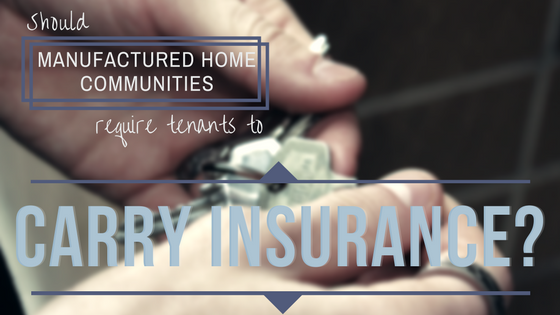Should Manufactured Home Communities Require Tenants to Carry Insurance?
June 23, 2017

Nowadays, many manufactured homeowners choose to place their homes in land-lease communities. In exchange for a reasonable monthly rent, a manufactured home community resident can have access to common utilities like water, electricity, natural gas, and sewer along with different amenities, such as cable, Internet, playgrounds, pools, and so on. Additionally, some would-be manufactured homebuyers rent a home in a manufactured home community in order to decide whether this housing alternative is right for them before investing in this type of home.
In addition to a series of terms and conditions that are typically stipulated in lease agreements, a manufactured home community owner or operator can include a provision that requires the residents who rent land or manufactured homes in those communities to get a manufactured home insurance policy.
Now, let’s take a look at the top benefits manufactured home communities can get by including an “insurance” clause in their leases.
It Mitigates the Risk of Higher Premiums
Manufactured homeowners insurance provides an extra layer of protection for community owners and operators.
As an example, if a visitor gets injured while on the property of one of your renters, he or she will most probably file a personal injury claim or lawsuit against your tenant and not against the community. If the tenant has manufactured homeowners insurance, the liability portion of his or her policy will cover medical payments, the amount of compensation awarded, and the legal costs associated. The manufactured homeowners insurance we make available at Triad Financial Services, for instance, includes a base limit of $50,000 in liability coverage, with the option to increase it up to $300,000.
But what if the resident doesn’t carry insurance? In that case, the visitor who has suffered the injury might file a claim against the community. If your insurer agrees to pay, higher premiums might follow.
It Covers Damage to the Home Itself, Additional Structures, and Personal Property
Covering perils like fire, explosion, thunderstorm, hailstorm, lightning, building collapse, theft, vandalism, and flood (particularly in flood zones A and V), a manufactured homeowners insurance plan can prevent costly claims from being filed against your community.
In a nutshell, manufactured homeowners insurance will pay for the repair and/or replacement of the home itself and other structures along with personal property that has been damaged, destroyed, lost, or stolen, according to pre-established limits.
Additionally, if one of your residents accidentally causes his or her neighbors to suffer a loss, through property damage or bodily injury, his or her insurer will pay for damages and/or injuries, up to the face amount of the policy.
It Covers Additional Living Expenses (ALE)
In some states, the manufactured home community owners or operators are responsible for finding tenants a temporary place to stay and covering the costs of relocation and temporary housing in the event that one or more manufactured homes become uninhabitable due to damage resulting from a fire or natural disaster.
The good news is that some manufactured home insurance programs provide compensation for alternative living arrangements. Also referred to as “loss of use” coverage, ALE coverage typically covers the costs of temporary living arrangements, including short-term rentals, hotel stays, storage for household items, increased food expenses, moving and transportation costs, and any other extra expenses that a tenant may incur because he or she needs to move out of his or her home temporarily due to damage resulting from a covered peril listed in the policy.
How long an insurance company will cover the costs of temporary living arrangements usually depends on the amount of coverage. In general, insurance companies continue to pay out additional living expenses until manufactured homes become habitable again or the coverage limits are reached.
It Promotes a Good Relationship with Tenants
Though it might not seem important, building a good relationship with your residents is a valuable component of successful community management.
Given that manufactured homeowners insurance can prevent arguments over liability issues between community operators and tenants, it can help manufactured home communities maintain a positive relationship with their residents, even when a major loss occurs.
It Gives You Peace of Mind
The thought that you won’t have to deal with your residents’ loss should a disaster strike can be very comforting. What’s more, requiring your residents to keep their manufactured homeowners insurance policies current is the best way to avoid legal liability being placed on the community. For continued peace of mind, make sure that all of your residents renew their insurance policies before they expire.
To learn more about the insurance coverage options available for manufactured homes and manufactured home communities, please call our insurance experts at 401-524-7641, or drop us a line at mmainelli@triadfs.com.
